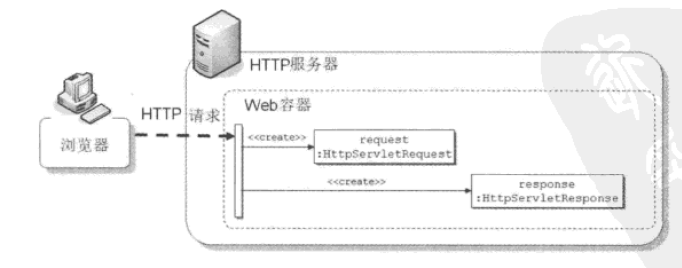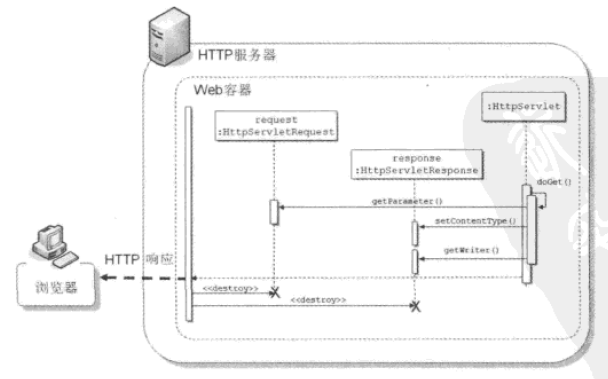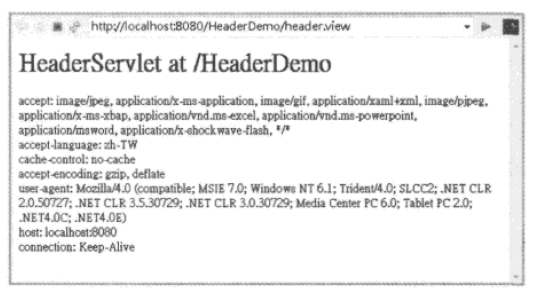一、从容器到HttpServlet
1、web容器作了什么
web容器做的事情就是,创建Servlet实例,并完成Servlet的名称注册及URL模式的对应。在请求来到时,web容器会转发给正确的Servlet来处理请求。
当请求来到http服务器时,而http服务器转交请求给容器时,容器会创建一个代表档次请求的HttpServletRequest对象,并将请求相关信息设置给该对象。同时,容器会创建一个HttpServletResponse对象,作为稍后要对客户端进行相应的java对象。

接着,容器会根据读取的@webServlet标注或者xml的设置,找出处理该请求的servlet,调用它的service()方法,将创建的HttpServletRequest对象、HttpServletResponse对象传入作为参数,service()方法中会根据HTTP请求的方式,调用对应的doXXX()方法。接着再doXXX()方法中,可以使用request、resposne对象,如:getParameter()取得请求参数,使用getWriter()取得输出用的PrintWriter对象,并进行各项响应处理。对PrintWriter做的输出操作,最后由容器转换为HTTP响应,再由HTTP服务器对浏览器响应。之后容器将对象销毁。

2、关于HttpServletRequest
2.1 处理请求参数与标头
String username = request.getParameter("name");指定请求参数名称来取得对应的值。如果传来的是"123"这样的字符串值,必须使用Integer.parseInt()这类方法剖析为基本类型。
String[] values = request.getParameterValues("param");就像param=10¶m=20¶m=30,此时用getParameterValues()取得一个String数组。
如果想要知道请求中有多少请求参数,则可以使用getParameterNames()方法,会返回一个Enumeration对象。
Enumeration<String> e = request.getParameterNames();
while(e.hasMoreElements()){
String param = e.nextElement();
...
}
对于HTTP标头的信息(Header),可以通过以下方法取得:
1、getHeader():使用方式与getParameter类似。
2、getHeaders():与getParameterValues类似。
3、getHeaderNames():与getParameterNames类似。
以下的实例如何取得并显示浏览器送出的标头信息。


1 package cc.openhome; 2 3 import java.io.IOException; 4 import java.io.PrintWriter; 5 import java.util.Enumeration; 6 7 import javax.servlet.ServletException; 8 import javax.servlet.annotation.WebServlet; 9 import javax.servlet.http.HttpServlet; 10 import javax.servlet.http.HttpServletRequest; 11 import javax.servlet.http.HttpServletResponse; 12 13 /** 14 * Servlet implementation class HeaderServlet 15 */ 16 @WebServlet("/header.view") 17 public class HeaderServlet extends HttpServlet { 18 private static final long serialVersionUID = 1L; 19 20 /** 21 * @see HttpServlet#HttpServlet() 22 */ 23 public HeaderServlet() { 24 super(); 25 // TODO Auto-generated constructor stub 26 } 27 28 /** 29 * @see HttpServlet#doGet(HttpServletRequest request, HttpServletResponse response) 30 */ 31 protected void doGet(HttpServletRequest request, HttpServletResponse response) throws ServletException, IOException { 32 // TODO Auto-generated method stub 33 PrintWriter out=response.getWriter(); 34 out.println("<html>"); 35 out.println("<head>"); 36 out.println("<title>HeadServlet</title>"); 37 out.println("</head>"); 38 out.println("<body>"); 39 out.println("<h1>HeaderServlet at "+request.getContextPath()+"</h1>");//取得应用程序环境路径 40 Enumeration<String> names=request.getHeaderNames();//取得所有标头名称 41 while(names.hasMoreElements()){ 42 String name=names.nextElement(); 43 out.println(name+": "+request.getHeader(name)+"<br>");//输出所有的标头值 44 } 45 out.println("</body>"); 46 out.println("</html>"); 47 out.close(); 48 } 49 50 /** 51 * @see HttpServlet#doPost(HttpServletRequest request, HttpServletResponse response) 52 */ 53 protected void doPost(HttpServletRequest request, HttpServletResponse response) throws ServletException, IOException { 54 // TODO Auto-generated method stub 55 } 56 57 }
运行结果:

2.2 getReader()、getInputStream()读取Body内容
getReader()方法,可以取得一个BufferedReader对象,可以读取Body数据。
例子1:读取请求Body内容


1 package cc.openhome; 2 3 import java.io.BufferedReader; 4 import java.io.IOException; 5 import java.io.PrintWriter; 6 7 import javax.servlet.ServletException; 8 import javax.servlet.annotation.WebServlet; 9 import javax.servlet.http.HttpServlet; 10 import javax.servlet.http.HttpServletRequest; 11 import javax.servlet.http.HttpServletResponse; 12 13 /** 14 * Servlet implementation class BodyServlet 15 */ 16 @WebServlet("/body.view") 17 public class BodyServlet extends HttpServlet { 18 private static final long serialVersionUID = 1L; 19 20 /** 21 * @see HttpServlet#HttpServlet() 22 */ 23 public BodyServlet() { 24 super(); 25 // TODO Auto-generated constructor stub 26 } 27 28 /** 29 * @see HttpServlet#doGet(HttpServletRequest request, HttpServletResponse response) 30 */ 31 protected void doGet(HttpServletRequest request, HttpServletResponse response) throws ServletException, IOException { 32 // TODO Auto-generated method stub 33 34 } 35 36 private String readBody(HttpServletRequest request) throws IOException { 37 // TODO Auto-generated method stub 38 BufferedReader reader=request.getReader();//取得BufferedReader对象 39 String input=null; 40 String requestBody=""; 41 while((input=reader.readLine())!=null){ 42 requestBody=requestBody+input+"<br>"; 43 } 44 return requestBody; 45 } 46 47 /** 48 * @see HttpServlet#doPost(HttpServletRequest request, HttpServletResponse response) 49 */ 50 protected void doPost(HttpServletRequest request, HttpServletResponse response) throws ServletException, IOException { 51 // TODO Auto-generated method stub 52 String body=readBody(request); 53 PrintWriter out=response.getWriter();//取得响应输出对象 54 out.println("<html>"); 55 out.println("<head>"); 56 out.println("<title>Servlet BodyView</title>"); 57 out.println("</head>"); 58 out.println("<body>"); 59 out.println(body); 60 out.println("</body>"); 61 out.println("</html>"); 62 out.close(); 63 } 64 65 }


1 <!DOCTYPE html> 2 <html> 3 <head> 4 <meta http-equiv="Content-Type" content="text/html; charset=UTF-8"> 5 <title>Insert title here</title> 6 </head> 7 <body> 8 <form action="body.view" method="post"> 9 名称:<input type="text" name="user"><br> 10 密码:<input type="password" name="passwd"><br><br> 11 <input type="submit" name="login" value="送出"> 12 </form> 13 </body> 14 </html>
在名称字段上输入“良葛格”,密码上输入“123456”,单机送出按钮,得到:

2.3 getPart()、getParts()取得上传文件
Servlet3.0中,新增了Part接口,可以方便进行文件上传处理。可以通过request对象的getPart()方法取得Part对象。
例1:上传文件到指定目录。


1 package cc.openhome; 2 3 import java.io.FileOutputStream; 4 import java.io.IOException; 5 import java.io.InputStream; 6 import java.io.OutputStream; 7 8 import javax.servlet.ServletException; 9 import javax.servlet.annotation.MultipartConfig; 10 import javax.servlet.annotation.WebServlet; 11 import javax.servlet.http.HttpServlet; 12 import javax.servlet.http.HttpServletRequest; 13 import javax.servlet.http.HttpServletResponse; 14 import javax.servlet.http.Part; 15 16 17 /** 18 * Servlet implementation class PhotoServlet 19 */ 20 @MultipartConfig(location="e:/java web/workspace/")//设置location属性 21 @WebServlet("/photo.do") 22 public class PhotoServlet extends HttpServlet { 23 private static final long serialVersionUID = 1L; 24 25 /** 26 * @see HttpServlet#HttpServlet() 27 */ 28 public PhotoServlet() { 29 super(); 30 // TODO Auto-generated constructor stub 31 } 32 33 /** 34 * @see HttpServlet#doGet(HttpServletRequest request, HttpServletResponse response) 35 */ 36 protected void doGet(HttpServletRequest request, HttpServletResponse response) throws ServletException, IOException { 37 // TODO Auto-generated method stub 38 } 39 40 /** 41 * @see HttpServlet#doPost(HttpServletRequest request, HttpServletResponse response) 42 */ 43 protected void doPost(HttpServletRequest request, HttpServletResponse response) throws ServletException, IOException { 44 // TODO Auto-generated method stub 45 request.setCharacterEncoding("UTF-8"); 46 Part part=request.getPart("photo"); 47 String filename=getFilename(part); 48 //writeTo(filename,part); 49 part.write(filename);//将文件写入location的指定目录 50 } 51 52 // private void writeTo(String filename, Part part) throws IOException { 53 // // TODO Auto-generated method stub 54 // InputStream in=part.getInputStream(); 55 // OutputStream out=new FileOutputStream("e:/java web/workspace/"+filename); 56 // byte[] buffer=new byte[1024]; 57 // int length=-1; 58 // while((length=in.read(buffer))!=-1){ 59 // out.write(buffer,0,length); 60 // } 61 // in.close(); 62 // out.close(); 63 // } 64 65 private String getFilename(Part part) { 66 // TODO Auto-generated method stub 67 String header=part.getHeader("Content-Disposition"); 68 String filename=header.substring(header.indexOf("filename=\"")+10,header.lastIndexOf("\"")); 69 return filename; 70 71 } 72 73 }


1 <!DOCTYPE html> 2 <html> 3 <head> 4 <meta http-equiv="Content-Type" content="text/html; charset=UTF-8" > 5 <title>Insert title here</title> 6 </head> 7 <body> 8 <form action="photo.do" method="post" enctype="multipart/form-data"> 9 上传相片:<input type="file" name="photo" value="" /><br> 10 <input type="submit" name="upload" value="上传"> 11 </form> 12 </body> 13 </html>
在Tomcat中必须设置@MultipartConfig标注才能使用getPart()相关API。@MultipartConfig也可以设置属性,比如location。@MultipartConfig(location="c:/workspace"),则上例子就可以修改为:


1 package cc.openhome; 2 3 import java.io.FileOutputStream; 4 import java.io.IOException; 5 import java.io.InputStream; 6 import java.io.OutputStream; 7 8 import javax.servlet.ServletException; 9 import javax.servlet.annotation.MultipartConfig; 10 import javax.servlet.annotation.WebServlet; 11 import javax.servlet.http.HttpServlet; 12 import javax.servlet.http.HttpServletRequest; 13 import javax.servlet.http.HttpServletResponse; 14 import javax.servlet.http.Part; 15 16 17 /** 18 * Servlet implementation class PhotoServlet 19 */ 20 @MultipartConfig(location="e:/java web/workspace/")//设置location属性 21 @WebServlet("/photo.do") 22 public class PhotoServlet extends HttpServlet { 23 private static final long serialVersionUID = 1L; 24 25 /** 26 * @see HttpServlet#HttpServlet() 27 */ 28 public PhotoServlet() { 29 super(); 30 // TODO Auto-generated constructor stub 31 } 32 33 /** 34 * @see HttpServlet#doGet(HttpServletRequest request, HttpServletResponse response) 35 */ 36 protected void doGet(HttpServletRequest request, HttpServletResponse response) throws ServletException, IOException { 37 // TODO Auto-generated method stub 38 } 39 40 /** 41 * @see HttpServlet#doPost(HttpServletRequest request, HttpServletResponse response) 42 */ 43 protected void doPost(HttpServletRequest request, HttpServletResponse response) throws ServletException, IOException { 44 // TODO Auto-generated method stub 45 request.setCharacterEncoding("UTF-8"); 46 Part part=request.getPart("photo"); 47 String filename=getFilename(part); 48 //writeTo(filename,part); 49 part.write(filename);//将文件写入location的指定目录 50 } 51 52 // private void writeTo(String filename, Part part) throws IOException { 53 // // TODO Auto-generated method stub 54 // InputStream in=part.getInputStream(); 55 // OutputStream out=new FileOutputStream("e:/java web/workspace/"+filename); 56 // byte[] buffer=new byte[1024]; 57 // int length=-1; 58 // while((length=in.read(buffer))!=-1){ 59 // out.write(buffer,0,length); 60 // } 61 // in.close(); 62 // out.close(); 63 // } 64 65 private String getFilename(Part part) { 66 // TODO Auto-generated method stub 67 String header=part.getHeader("Content-Disposition"); 68 String filename=header.substring(header.indexOf("filename=\"")+10,header.lastIndexOf("\"")); 69 return filename; 70 71 } 72 73 }
如果有多个文件要上传,可以使用getParts方法,这回返回一个Collection<Part>,其中是每个上传文件的part对象。
例子2:上传多个文件


1 package cc.openhome; 2 3 import java.io.DataInputStream; 4 import java.io.FileOutputStream; 5 import java.io.IOException; 6 import java.io.UnsupportedEncodingException; 7 8 import javax.servlet.ServletException; 9 import javax.servlet.annotation.WebServlet; 10 import javax.servlet.http.HttpServlet; 11 import javax.servlet.http.HttpServletRequest; 12 import javax.servlet.http.HttpServletResponse; 13 14 15 16 /** 17 * Servlet implementation class UploadServlet 18 */ 19 @WebServlet("/upload.do") 20 public class UploadServlet extends HttpServlet { 21 private static final long serialVersionUID = 1L; 22 23 /** 24 * @see HttpServlet#HttpServlet() 25 */ 26 public UploadServlet() { 27 super(); 28 // TODO Auto-generated constructor stub 29 } 30 31 /** 32 * @see HttpServlet#doGet(HttpServletRequest request, HttpServletResponse response) 33 */ 34 protected void doGet(HttpServletRequest request, HttpServletResponse response) throws ServletException, IOException { 35 // TODO Auto-generated method stub 36 } 37 38 /** 39 * @see HttpServlet#doPost(HttpServletRequest request, HttpServletResponse response) 40 */ 41 protected void doPost(HttpServletRequest request, HttpServletResponse response) throws ServletException, IOException { 42 // TODO Auto-generated method stub 43 request.setCharacterEncoding("UTF-8"); 44 //锟斤拷取锟斤拷锟斤拷Body 45 byte[] body=readBody(request); 46 //取锟斤拷锟斤拷锟斤拷Body锟斤拷锟捷碉拷锟街凤拷锟斤拷锟斤拷示 47 String textBody=new String(body,"UTF-8"); 48 //取锟斤拷锟较达拷锟斤拷锟斤拷锟斤拷锟侥硷拷 49 String filename=getFilename(textBody); 50 //取锟斤拷锟侥硷拷锟斤拷始锟斤拷锟斤拷锟轿伙拷锟� 51 Position p=getFilePosition(request,textBody); 52 //锟斤拷锟斤拷锟斤拷募锟� 53 writeTo(filename,body,p); 54 } 55 56 private void writeTo(String filename, byte[] body, Position p) throws IOException { 57 // TODO Auto-generated method stub 58 FileOutputStream fileOutputStream=new FileOutputStream("e:/java web/workspace/"+filename); 59 fileOutputStream.write(body,p.begin,(p.end-p.begin)); 60 fileOutputStream.flush(); 61 fileOutputStream.close(); 62 } 63 64 private Position getFilePosition(HttpServletRequest request, String textBody) throws UnsupportedEncodingException { 65 // TODO Auto-generated method stub 66 //取得实际上传的文件 67 String contentType=request.getContentType(); 68 String boundaryText=contentType.substring(contentType.lastIndexOf("=")+1,contentType.length()); 69 //取得实际上传的文件 70 int pos=textBody.indexOf("filename=\""); 71 pos=textBody.indexOf("\n",pos)+1; 72 pos=textBody.indexOf("\n",pos)+1; 73 pos=textBody.indexOf("\n",pos)+1; 74 int boundaryLoc=textBody.indexOf(boundaryText,pos)-4; 75 int begin=((textBody.substring(0,pos)).getBytes("GBK")).length; 76 int end=((textBody.substring(0,boundaryLoc)).getBytes("GBK")).length; 77 return new Position(begin, end); 78 } 79 80 private String getFilename(String textBody) { 81 // TODO Auto-generated method stub 82 String filename=textBody.substring(textBody.indexOf("filename=\"")+10); 83 filename=filename.substring(0,filename.indexOf("\n")); 84 filename=filename.substring(filename.lastIndexOf("\\")+1,filename.indexOf("\"")); 85 return filename; 86 } 87 88 private byte[] readBody(HttpServletRequest request) throws IOException { 89 // TODO Auto-generated method stub 90 int formatDataLength=request.getContentLength(); 91 DataInputStream dataStream=new DataInputStream(request.getInputStream());//取锟斤拷InputStraem锟侥讹拷锟斤拷 92 byte body[]=new byte[formatDataLength]; 93 int totalBytes=0; 94 while(totalBytes<formatDataLength){ 95 int bytes=dataStream.read(body,totalBytes,formatDataLength); 96 totalBytes+=bytes; 97 } 98 return body; 99 } 100 101 } 102 class Position{ 103 int begin; 104 int end; 105 public Position(int begin,int end) { 106 // TODO Auto-generated constructor stub 107 this.begin=begin; 108 this.end=end; 109 } 110 }


1 <!DOCTYPE html> 2 <html> 3 <head> 4 <meta http-equiv="Content-Type" content="text/html; charset=UTF-8" > 5 <title>Insert title here</title> 6 </head> 7 <body> 8 <form action="upload1.do" method="post" enctype="multipart/form-data"> 9 文件1:<input type="file" name="file1" value="" /><br> 10 文件2:<input type="file" name="file2" value="" /><br> 11 文件3:<input type="file" name="file3" value="" /><br><br> 12 <input type="submit" name="upload" value="上传"/> 13 </form> 14 </body> 15 </html>
2.4 使用RequestDispatcher调派请求
在web应用程序中,经常需要多个Servlet来完成请求。例如,将另一个Servlet的请求处理流程包含进来,或者将请求转发forward给别的servlet处理。可以使用:
RequestDispatcher dispatcher = request.getRequestDispatcher("some.do");
(1)、使用include()方法
将另一个servlet的操作流程包括至目前的servlet操作之中。
例1:include方法


1 package cc.openhome; 2 3 import java.io.IOException; 4 import java.io.PrintWriter; 5 6 import javax.servlet.RequestDispatcher; 7 import javax.servlet.ServletException; 8 import javax.servlet.annotation.WebServlet; 9 import javax.servlet.http.HttpServlet; 10 import javax.servlet.http.HttpServletRequest; 11 import javax.servlet.http.HttpServletResponse; 12 13 /** 14 * Servlet implementation class Some 15 */ 16 @WebServlet("/some.view") 17 public class Some extends HttpServlet { 18 private static final long serialVersionUID = 1L; 19 20 /** 21 * @see HttpServlet#HttpServlet() 22 */ 23 public Some() { 24 super(); 25 // TODO Auto-generated constructor stub 26 } 27 28 /** 29 * @see HttpServlet#doGet(HttpServletRequest request, HttpServletResponse response) 30 */ 31 protected void doGet(HttpServletRequest request, HttpServletResponse response) throws ServletException, IOException { 32 // TODO Auto-generated method stub 33 PrintWriter out=response.getWriter(); 34 out.println("Some do one..."); 35 RequestDispatcher dispatcher=request.getRequestDispatcher("other.view?data=123456"); 36 dispatcher.include(request, response); 37 out.println("Some do two..."); 38 out.close(); 39 } 40 41 /** 42 * @see HttpServlet#doPost(HttpServletRequest request, HttpServletResponse response) 43 */ 44 protected void doPost(HttpServletRequest request, HttpServletResponse response) throws ServletException, IOException { 45 // TODO Auto-generated method stub 46 } 47 48 }


1 package cc.openhome; 2 3 import java.io.IOException; 4 import java.io.PrintWriter; 5 6 import javax.servlet.ServletException; 7 import javax.servlet.annotation.WebServlet; 8 import javax.servlet.http.HttpServlet; 9 import javax.servlet.http.HttpServletRequest; 10 import javax.servlet.http.HttpServletResponse; 11 12 /** 13 * Servlet implementation class OtherServlet 14 */ 15 @WebServlet("/other.view") 16 public class OtherServlet extends HttpServlet { 17 private static final long serialVersionUID = 1L; 18 19 /** 20 * @see HttpServlet#HttpServlet() 21 */ 22 public OtherServlet() { 23 super(); 24 // TODO Auto-generated constructor stub 25 } 26 27 /** 28 * @see HttpServlet#doGet(HttpServletRequest request, HttpServletResponse response) 29 */ 30 protected void doGet(HttpServletRequest request, HttpServletResponse response) throws ServletException, IOException { 31 // TODO Auto-generated method stub 32 PrintWriter out=response.getWriter(); 33 out.println("Other do one.."); 34 } 35 36 /** 37 * @see HttpServlet#doPost(HttpServletRequest request, HttpServletResponse response) 38 */ 39 protected void doPost(HttpServletRequest request, HttpServletResponse response) throws ServletException, IOException { 40 // TODO Auto-generated method stub 41 } 42 43 }
运行结果:网页上看到响应顺序是Some do one ... Other do one... Some do two.. .
(2)、使用forward()方法
将处理请求转发给别的Servlet。
例2:forwod方法


1 package cc.openhome; 2 3 import java.io.IOException; 4 5 import javax.servlet.ServletException; 6 import javax.servlet.annotation.WebServlet; 7 import javax.servlet.http.HttpServlet; 8 import javax.servlet.http.HttpServletRequest; 9 import javax.servlet.http.HttpServletResponse; 10 11 import com.sun.javafx.sg.prism.NGShape.Mode; 12 import com.sun.media.sound.ModelAbstractChannelMixer; 13 14 /** 15 * Servlet implementation class HelloController 16 */ 17 @WebServlet("/hello.do") 18 public class HelloController extends HttpServlet { 19 private static final long serialVersionUID = 1L; 20 private HelloModel model=new HelloModel(); 21 /** 22 * @see HttpServlet#HttpServlet() 23 */ 24 public HelloController() { 25 super(); 26 // TODO Auto-generated constructor stub 27 } 28 29 /** 30 * @see HttpServlet#doGet(HttpServletRequest request, HttpServletResponse response) 31 */ 32 protected void doGet(HttpServletRequest request, HttpServletResponse response) throws ServletException, IOException { 33 // TODO Auto-generated method stub 34 String name=request.getParameter("user");//收集请求参数 35 String message=model.doHello(name);//委托HelloModel对象处理 36 request.setAttribute("message", message);//将结果信息设置至请求对像成属性 37 request.getRequestDispatcher("hello1.view").forward(request, response); 38 } 39 40 /** 41 * @see HttpServlet#doPost(HttpServletRequest request, HttpServletResponse response) 42 */ 43 protected void doPost(HttpServletRequest request, HttpServletResponse response) throws ServletException, IOException { 44 // TODO Auto-generated method stub 45 46 } 47 48 }


1 package cc.openhome; 2 3 import java.util.*; 4 5 6 7 public class HelloModel { 8 private Map<String, String>messages=new HashMap<String,String>(); 9 public HelloModel(){ 10 messages.put("caterpillar", "Hello"); 11 messages.put("Justin", "Welcome"); 12 messages.put("momor", "Hi"); 13 } 14 public String doHello(String user){ 15 String message=messages.get(user); 16 return message+", "+user+"!"; 17 } 18 }


1 package cc.openhome; 2 3 import java.io.IOException; 4 import javax.servlet.ServletException; 5 import javax.servlet.annotation.WebServlet; 6 import javax.servlet.http.HttpServlet; 7 import javax.servlet.http.HttpServletRequest; 8 import javax.servlet.http.HttpServletResponse; 9 10 /** 11 * Servlet implementation class HelloView 12 */ 13 @WebServlet("/hello1.view") 14 public class HelloView extends HttpServlet { 15 private static final long serialVersionUID = 1L; 16 private String htmlTemplate= 17 "<html>" 18 + "<head>" 19 + "<meta http-equiv='Content-Type'" 20 + "content='text/html; charset=UTF-8'>" 21 + "<title>%s</title>" 22 + "</head>" 23 + "<body>" 24 + "<h1>%s</h1>" 25 + "</body>" 26 +"</html>"; 27 /** 28 * @see HttpServlet#HttpServlet() 29 */ 30 public HelloView() { 31 super(); 32 // TODO Auto-generated constructor stub 33 } 34 35 /** 36 * @see HttpServlet#doGet(HttpServletRequest request, HttpServletResponse response) 37 */ 38 protected void doGet(HttpServletRequest request, HttpServletResponse response) throws ServletException, IOException { 39 // TODO Auto-generated method stub 40 String user=request.getParameter("user");//取得请求参数 41 String message=(String) request.getAttribute("message");//取得请求属性 42 String html=String.format(htmlTemplate, user,message);//产生html结果 43 response.getWriter().print(html);//输出html结果 44 45 } 46 47 /** 48 * @see HttpServlet#doPost(HttpServletRequest request, HttpServletResponse response) 49 */ 50 protected void doPost(HttpServletRequest request, HttpServletResponse response) throws ServletException, IOException { 51 // TODO Auto-generated method stub 52 } 53 54 }
运行结果:(Model2架构)

当神已无能为力,那便是魔渡众生


